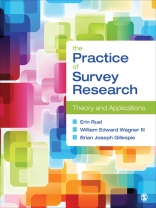Unique in its integration of theory and application, this comprehensive book explains survey design, implementation, data analysis, and continuing data management, including how to effectively incorporate the latest technology (e.g., Survey Monkey and Qualtrics). Data management and analysis are demonstrated and explained through statistical software including SPSS, SAS, and STATA. In addition to helping students develop a complete understanding of survey research from start to finish, the authors also address the challenges and issues of specific disciplines.
Spis treści
Part I: Before the Survey
Chapter 1: Introduction to Survey Research
What is survey research?
How do you know if a survey is good?
Surveys about Teachers: Are They Good Teachers?
Applications of Survey Research
Technology and Survey Research
The Ethics of Survey Research
Key Decisions about Survey Research: What’s Ahead
Part II: Questionnaire Design
Chapter 2: Types of Surveys
Omnibus Surveys
Administration
Importance of Proper Training of Interviewers
Types of Surveys
Chapter 3: The Survey Instrument
The Cover Letter
The Survey Instrument
Appearance, Formatting, and Design
Chapter 4: Survey Question Construction
Concept Measurement: Traits, Assessments, and Sentiments
Complex Concepts Question Development
Responses to Questions
Measurement Error
Chapter 5: Validity and Reliability
Reliability
Correlation
Types of Reliability and Estimation
Validity
Chapter 6: Pre-testing and Pilot Testing
Pre-testing
Pilot Testing
Pre-test and Pilot Test Limitations
Part III: Implementing a Survey
Chapter 7: Selecting a Sample: Probability Sampling
Sampling Terminology
Sampling Theory
Probability Sampling Techniques
Chapter 8: Non-Probability Sampling and Sampling Hard to Find Populations
Convenience Sampling
Quota Sampling
Purposive Sampling
Sampling Hard to Find Populations
Chapter 9: Improving Response Rates and Retention
Response Rates and Non-response Errors
Non-response Bias
Attrition in Panel Studies
Methods to Increase Participant Contact and Participant Cooperation
Chapter 10: Technologies to Develop and Implement Surveys
Mail Survey Administration
Computer-assisted Interviewing
Post-survey Data Entry and Data Cleaning Technology
Contracting with a Research Center to Conduct the Survey
Chapter 11: Data Collection
The Self-administered Cross-sectional Mailed Survey
The Self-administered Longitudinal Panel Mailed Survey
Interviewer-administered Surveys
Self-administered Web Surveys
Comparing Survey Types
Storage Needs
Part IV: Post-Survey Data Management and Analysis
Chapter 12: Data Entry
Data Entry
Documentation
Chapter 13: Data Cleaning
Simple Cross-sectional Data Cleaning
Cosmetic Cleaning
Skip Patterns
Multiple-response Questions, Other Specify and Open-ended Questions
Cleaning for Diagnostics
Interviewer Effects/Mode Effects
Cleaning Longitudinal Data
The Codebook
Chapter 14: Data Analysis for a Policy Report
Policy Reports
Descriptive Statistics
Analysis for a Policy Report
Summary
The Report Write-up
Chapter 15: More Advanced Data Analysis
Explanatory Research Questions
Journal Article Format
Regression Analysis
Addressing Missing Data
OLS Regressions of the Positive Relocation Scale
Creating Tables for the Journal Article and Writing-up the Results
Chapter 16: Data Archiving
Seeking External Funding for Your Survey Project
Archiving Original and Final Data
Data Format
Archiving and Making Data Publicly Available
Archives
Epilogue
Survey Administration checklist
Survey Design and Organization Checklist
Writing Good Questions Checklist
Piloting or Pre-Testing the Survey Checklist
Choosing a Sample Checklist
Improving Response Rates Checklist
O autorze
Brian Joseph Gillespie, Ph.D. is a researcher in the Faculty of Spatial Sciences at the University of Groningen in the Netherlands. He is the author of Household Mobility in America: Patterns, Processes, and Outcomes (Palgrave, 2017) and coauthor of The Practice of Survey Research: Theory and Applications (Sage, 2016) and Using and Interpreting Statistics in the Social, Behavioral, and Health Sciences (Sage, 2018). He has also published research in a variety of social science journals on topics related to family, migration, the life course, and interpersonal relationships.












